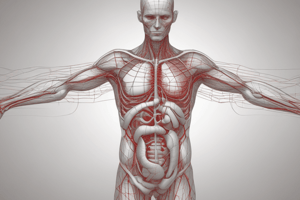Podcast
Questions and Answers
What is the normal heart rate range for an adult?
What is the normal heart rate range for an adult?
- 80-110 beats/minute
- 75-100 beats/minute
- 90-140 beats/minute
- 60-100 beats/minute (correct)
What is the normal range of breaths per minute?
What is the normal range of breaths per minute?
- 20-24
- 16-20 (correct)
- 24-28
- 12-16
Where is the radial pulse typically measured?
Where is the radial pulse typically measured?
- Inner aspect of the wrist (correct)
- Medial surface of the ankle
- Inner aspect of the biceps muscle of the arm
- Intercostal spaces
What is the term for the difference between systolic and diastolic blood pressure?
What is the term for the difference between systolic and diastolic blood pressure?
What is the term for difficulty of breathing?
What is the term for difficulty of breathing?
What is the characteristic of Cheyne-Stokes Respiration?
What is the characteristic of Cheyne-Stokes Respiration?
What type of breathing is characterized by prolonged gasping inspiration followed by very short expiration?
What type of breathing is characterized by prolonged gasping inspiration followed by very short expiration?
What is the definition of hypertension?
What is the definition of hypertension?
Where is the femoral pulse typically measured?
Where is the femoral pulse typically measured?
What is the term for breathing that is punctuated by frequent sighs?
What is the term for breathing that is punctuated by frequent sighs?
What is the term for the harsh, crowing sounds produced on inspiration due to acute constriction of the trachea?
What is the term for the harsh, crowing sounds produced on inspiration due to acute constriction of the trachea?
What is the normal range of blood pressure in mmHg?
What is the normal range of blood pressure in mmHg?
A pulse rate of 160 beats per minute is classified as?
A pulse rate of 160 beats per minute is classified as?
Which pulse is characterized by a very forceful beat, with the artery falling away very quickly?
Which pulse is characterized by a very forceful beat, with the artery falling away very quickly?
What is the term for the difference between the apical and radial pulse taken simultaneously?
What is the term for the difference between the apical and radial pulse taken simultaneously?
Which pulse is located at the apex of the heart, at the left side of the chest?
Which pulse is located at the apex of the heart, at the left side of the chest?
What is the term for a pulse that occasionally skips?
What is the term for a pulse that occasionally skips?
A pulse rate of 50 beats per minute is classified as?
A pulse rate of 50 beats per minute is classified as?
Flashcards are hidden until you start studying
Study Notes
Respiratory Rhythms
- Increased rate and depth: exceeds 20 breaths per minute
- Common causes: metabolic acidosis and renal failure
- Apneustic Breathing: prolonged gasping inspiration followed by very short expiration
- Biot's Breathing: shallow breaths interrupted by apnea
- Common in patients with CNS disorders
Sounds of Breathing
- Wheezes: constricted airway, more apparent in expiration
- Stridor: acute constriction of the trachea, produces harsh crowing sounds on inspiration
- Rales or Rhonchi: bubbling or cracking sounds, resulting from fluids in the lungs
Blood Pressure
- Normal value: 90-130/60-90 mmHg
- Measured in millimeters of mercury (mmHg)
- Pulse pressure: difference between systolic and diastolic pressure
- Korotkoff's sound: series of sounds on auscultation when taking BP
Definition of Terms
- Hypotension: abnormally low blood pressure (systolic below 100mmHg)
- Hypertension: abnormally high blood pressure
- Systolic pressure: pressure of the blood as a result of ventricular contraction
Heart Rate
- Normal range: 60-100 beats per minute
- Age-specific heart rates:
- Infants: 120-160 beats/min
- Toddlers: 90-140 beats/min
- Preschoolers: 80-110 beats/min
- School age: 75-100 beats/min
- Adolescent: 60-90 beats/min
- Adult: 60-100 beats/min
Pulse
- Definition: a measure of the pressure exerted by the blood as it flows through the arteries
- Types of pulse rhythm:
- Arrythmias: irregularities of rhythm
- Tachycardia: pulse rate higher than 150/min
- Bradycardia: slow abnormal heart rhythms (heart rate below 60 beats/min)
- Types of pulse:
- Peripheral pulse: located in the periphery of the body
- Apical pulse: central pulse at the apex of the heart
- Abnormal pulse rhythms:
- Bounding pulse: reaches a higher level than normal, then disappears quickly
- Running pulse: rate too fast to be counted
- Feeble/Weak/Thready pulse: volume is small that it can be readily obliterated
- Water hammer or Corrigan's pulse: very forceful beat, with the artery falling away very quickly
- Dicrotic pulse: one heart beat for two arterial pulsations, giving a sensation of double beat
- Pulse deficit: difference between the apical and radial pulse taken simultaneously
Studying That Suits You
Use AI to generate personalized quizzes and flashcards to suit your learning preferences.




